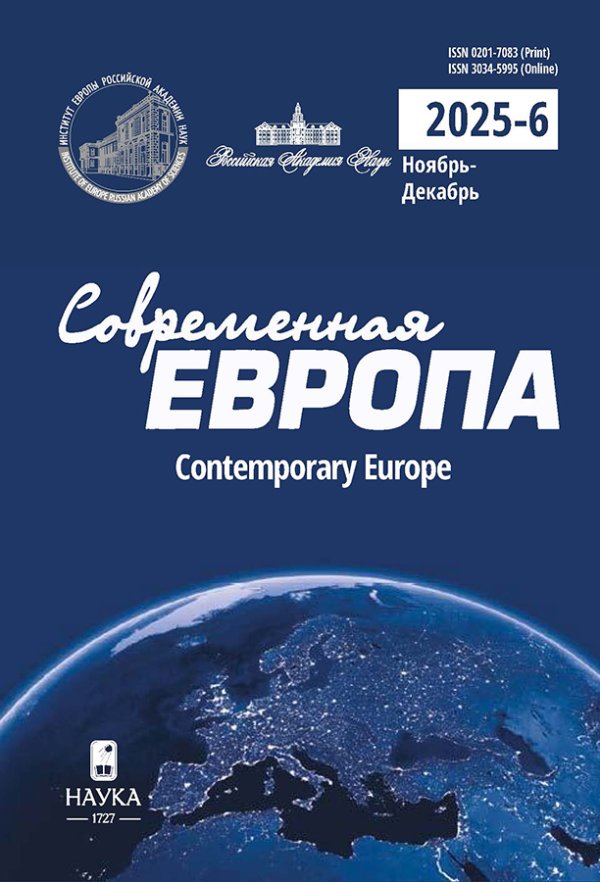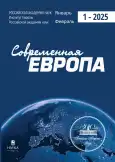No 1 (129) (2025)
EUROPEAN PROCESS: COUNTRIES AND REGIONS
Enlargement as a Special Case of EU External Differentiation
Abstract
 5-17
5-17


The Chinese Vector of EU Cooperation in Science and Technology: Adjusting the Strategy
Abstract
 18-33
18-33


Patriotic Issues on the Integration Agenda of the Union State of Belarus and Russia
Abstract
 34-44
34-44


PARTIES AND POLITICAL MOVEMENTS
The Role of President R. Radev in the Political Struggle in Bulgaria (2016‒2024)
Abstract
 45-55
45-55


Autonomist and Separatist Parties in Britain and France: Emphasis on the Left
Abstract
 56-66
56-66


PROBLEMS OF ECONOMY
Leave Not Stay: Analysis of the Behavior of European Companies Under Sanctions on Russia
Abstract
 67-81
67-81


Prospects of Russia in the European LNG Market Under Sanctions
Abstract
 82-95
82-95


Fiscal Rules in the European Union: Goals, Evolution, Results
Abstract
 96-108
96-108


SECURITY ISSUES
Mechanism of Foreign Policy Coordination Within the Framework of the Collective Security Treaty Organization
Abstract
 109-120
109-120


GEOPOLITICAL CONFLICT BETWEEN GREAT POWERS IN THE 21ST CENTURY: ANALYSIS OF THE UKRAINIAN CRISIS
Abstract
The Ukrainian crisis is not just an armed conflict between two nations, but also reflects the geopolitical competition between great powers in the 21st century. This paper will analyze the deep-rooted origins leading to the military conflict through a geopolitical lens, delving into the long process of historical tensions and confrontation between Russia and the West represented by the North Atlantic Treaty Organization (NATO) regarding the issue of Ukraine. The study will explore Russia’s geostrategic motives in starting special military operation in Ukraine, NATO’s efforts to expand its influence into this region, as well as the complex developments that caused the conflict to escalate into the largest armed war since the beginning of the 21st century. Through this, the paper analyzes the profound nature of the geopolitical crisis in Ukraine in the context of the power struggle between major powers in this strategic region; provide a comprehensive view of the motives, strategies of the parties involved, as well as the far-reaching implications this conflict has caused for security in the European region. In doing so, it contributes to a better understanding of the complex nature of geopolitical conflict and security in the 21st century.
 121-135
121-135


SOCIAL SPHERE
Digitalization of Healthcare in BRICS+ Countries
Abstract
 136-149
136-149


British Higher Education for International Students: New Challenges
Abstract
 150-163
150-163


ПРОБЛЕМЫ МИГРАЦИИ
Afghans in Europe: From Victimhood to Activism?
Abstract
 164-174
164-174


HISTORY AND MODERNITY
The Historical Memory of the Grand Principality of Lithuania in the Belorussian Society in the XX – early XXI century
Abstract
 175-184
175-184


ТРИБУНА МОЛОДОГО УЧЁНОГО
Formation of the European Identity of the Western Balkan States in the XXI Century
Abstract
 185-192
185-192


Norway's Policy of Self-Imposed Military Restrictions: Contemporary Challenges and Contradictions
Abstract
 193-203
193-203


REFLECTING ON WHAT WE HAVE READ
Conflict and Crisis Knots of Modern Geopolitics: French Analytical Experience
Abstract
 204-213
204-213


IN MEMORIAM
Vitaliy Vladimirovich Zhurkin (14 yanvarya 1928 ‒ 26 fevralya 2025)
 214-226
214-226


Sergey Mikhaylovich ROGOV (22 oktyabrya 1948 ‒ 9 fevralya 2025)
 227-227
227-227












